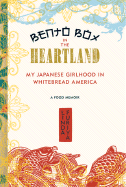
 Linda Furiya grew up in Versailles, Ind., a farming community where her father worked during the day sexing chickens and then swing shift at a truck engine factory. He came to the U. S. in the '50s (born in California, he served in the Japanese army, and spent time in a Soviet POW camp), and her mother arrived in 1961 after an arranged marriage proposal. When Linda asked him why he moved to the Midwest, of all places, he told her a story about his daimyo clan and their last name, which means "falling arrow," and said, "Someday you will also shoot and follow your arrow. My arrow, it landed here." Her mother was a combination of an independent, strong woman (she came to the U.S. with a round-trip ticket, in case her fiancé wasn't good-looking) and subservient Japanese wife. Her deference was hard for Linda to fathom, but as she thinks back on her criticism of how her mother waited on both husband and sons, she says, "Today, Mom still fetches and fusses over Dad, but I don't say anything as I catch a sense of enjoyment that was probably there all along but that I was never able to detect through my prejudices in the past." Her prejudices and her reconciliation with her upbringing form the core of this engaging memoir.
Linda Furiya grew up in Versailles, Ind., a farming community where her father worked during the day sexing chickens and then swing shift at a truck engine factory. He came to the U. S. in the '50s (born in California, he served in the Japanese army, and spent time in a Soviet POW camp), and her mother arrived in 1961 after an arranged marriage proposal. When Linda asked him why he moved to the Midwest, of all places, he told her a story about his daimyo clan and their last name, which means "falling arrow," and said, "Someday you will also shoot and follow your arrow. My arrow, it landed here." Her mother was a combination of an independent, strong woman (she came to the U.S. with a round-trip ticket, in case her fiancé wasn't good-looking) and subservient Japanese wife. Her deference was hard for Linda to fathom, but as she thinks back on her criticism of how her mother waited on both husband and sons, she says, "Today, Mom still fetches and fusses over Dad, but I don't say anything as I catch a sense of enjoyment that was probably there all along but that I was never able to detect through my prejudices in the past." Her prejudices and her reconciliation with her upbringing form the core of this engaging memoir.Much of Furiya's childhood was idyllic, with the warmth of the Midwest a backdrop: "Summer vacation lay before me like a lazy ripple moving across a lake. My brothers and I spent our days digging for crawdads by the creek and our evenings catching fireflies as the dew fell . . . the early evening air cast a bluish tint as light leaked away from the muggy summer sky like a drying watercolor." And much of her childhood was spent worrying about being different, trying to fit in to her whitebread community. By turns protective of and embarrassed by her parents, she resented her role as mediator and translator. But she had one means of communication and solace: food. "It was only at the dinner table when I was a child, and later in the kitchen, that I experienced an absolute peace and connection with my Japanese heritage. Each bite, taste, cut of the knife . . . was solely my own experience that couldn't be diminished or belittled." As an adult, she realized that eating had been her family's communion, and Japanese home cooking was the only daily thread her parents had to their culture. Her enjoyment of food and sensation will make you hungry: "I dipped the piping hot gyoza into a shallow bath of tangy soy dipping sauce. I bit into the crescent shapes--crunchy on one side, soft textured on the other, and juicy hot on the inside. My first bite broke the skin . . . flooding my mouth with the savory ginger and garlic pork filling." Fortunately, she includes recipes at the end of each chapter.
Linda Furiya puzzles through her ingrained reticence and how it was formed growing up where she did, with the parents she had. They didn't instill in Linda or her brothers a strong sense of pride in their ethnicity or to even stand up for themselves. "We had to learn that all on our own as they did." But the other side of the coin, as she came to appreciate, was that her parents "always opted to rise above their pain. They did not allow themselves to get pulled under by disappointment and resentment." She comes to a place where she can treasure and honor the uniqueness of her childhood, and appreciate her mother's sense of adventure and self-sacrifice. When her father talks about his life in Japan, she understands why he switches from articulate Japanese to less-fluent English--it's his way of distancing himself from his early memories. Bento Box in the Heartland is a sensitive, graceful memoir. I hope she writes a sequel.--Marilyn Dahl

